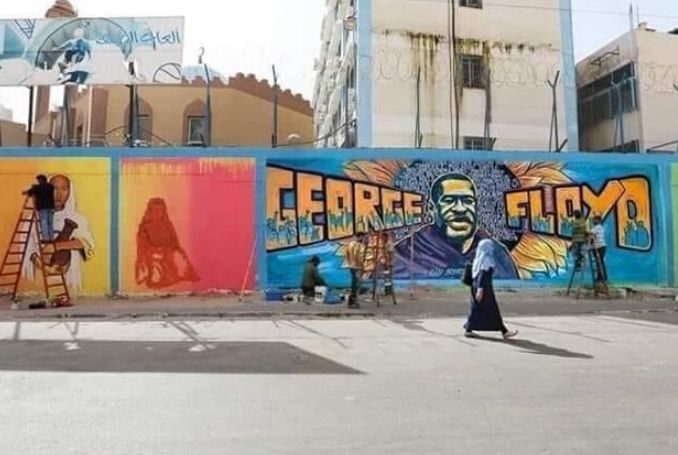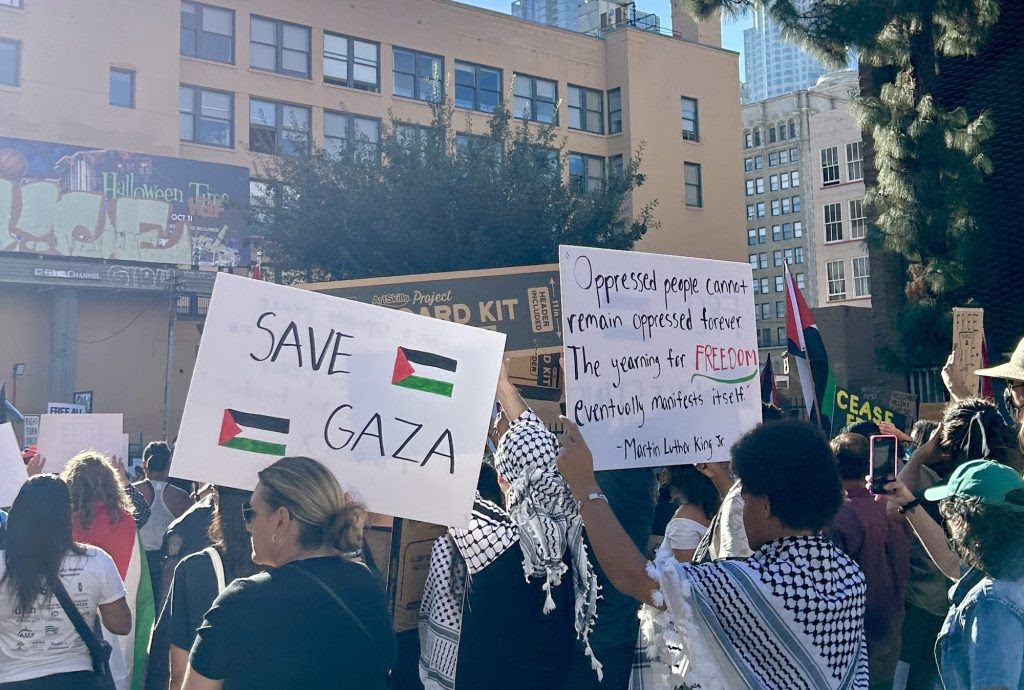Ours Is an Indigenous Struggle: How Gaza United the World
PALESTINE ISRAEL GAZA GENOCIDE, 27 Nov 2023
Ramzy Baroud and Romana Rubeo | Politics for the People – TRANSCEND Media Service

Palestinian artists painting George Floyd on the walls on UNRWA office, in Gaza.
(Photo: via UNRWA Website)
24 Nov 2023 – For decades, the struggle for national liberation in Palestine was rightly understood to be part and parcel of a global struggle for liberation, mainly in the Global South.
And since national liberation movements were, per definition, the struggle for indigenous people to assert their collective rights for freedom, equality and justice, the Palestinian struggle was positioned as part of this global indigenous movement.
Alas, the collapse of the Soviet Union, the growing dominance of the United States and its allies, the return of Western colonialism in the form of neocolonialism to Africa, the Middle East and elsewhere, have localized many of the indigenous movements’ struggles.
This proved costly, as it allowed France, the US, Britain and others to, once more, sectionalize the Global South into regions of influence, controlling them through whatever military, political and economic strategies they had in mind. Similar to the scramble for Africa in the late 19th century, recent decades wrought a new kind of colonial scramble for the Global South.
In the Palestinian context, in particular, the struggle was multi-faceted: the demise of global powers, like the USSR, which created some kind of geopolitical balance, isolated Palestinian Resistance movements. This forced these movements, namely those involved in the Palestine Liberation Organization (PLO), to seek political ‘compromises’, without achieving anything tangible in return.
For Washington, these concessions on the part of a once national liberation movement in Palestine, were consistent with the US’s regional agenda and the quest for a ‘New Middle East’.
Ultimately, this resulted in the wrongly termed ‘Palestinian division’, factional clashes in 2007, and a state of political paralysis which defined the so-called Palestinian leadership.
And, while Palestinians were busy sorting out their political and leadership crisis, Israel’s settler-colonial process accelerated, at the expense of whatever remained of the Occupied Palestinian Territories.
Of course, this does not, from an intellectual and historical point of view, alter the essential nature of the Palestinian struggle, which remained that of an indigenous nation fighting for its rights. However, it did confuse the political definitions and discourses surrounding the so-called Palestinian-Israeli conflict.
This confusion was a direct outcome of the misrepresentation of the Palestinian struggle through Israeli propaganda and US-Western media, which remained committed to elevating the Israeli line. Israel invested in presenting Palestinians as a divided people, who have no vision of peace, and their Resistance movements as essentially terrorist groups, hellbent on the destruction of Israel and so on.

Protest for the end of Israeli aggression and Palestinian liberation in Los Angeles, 28 Oct 2023. Photo by ScheerPost staff editor
But things began to change in recent years, with the revival of indigenous movements around the world, from the Black struggle in the US to the indigenous people resurgence in North and South America, to the ultimate rise of an actual global movement, centered around landless societies and indigenous rights – which heavily invested in global solidarity and intersectionality, allowing it to multiply its powers several times over.
The common element of “decolonization” – in all its manifestations – has created intersectional links among various struggles around the world, which allowed the Palestinian struggle for liberation to fit perfectly into the new global narrative.
“Black Australians and Palestinians share a history and reality of erasure that has lasted far beyond the anticolonial era of the early last century, when most colonized peoples gained independence from colonial powers,” Eugenia Flynn and Tasnim Sammak wrote in their article ‘Black Australia to Palestine: solidarity in decolonial struggle’.
The Black Lives Matter Movement also played a central role in recentering Palestine around urgent and revived struggles in the United States and even beyond US political geography.
“Palestinians played a crucial role in the (2014) Ferguson, Missouri, uprising that flared that year in the wake of the police killing of Black teenager Michael Brown,” Russell Rickford wrote in an article in Vox.
“Palestinian activists used social media to share with African American protesters tactics for dealing with tear gas attacks by militarized police forces — an experience with which many subjects of Israeli occupation are all too familiar,” Rickford added.
This was only the beginning, however, as, over the years, Palestine began featuring as a staple in the Black struggle discourse in the US. Both movements fed on each other’s popularity, conceiving new networks and connecting other global struggles together in a most harmonious fashion.
All of this has been propelled forward by the growing connectivity of activists and their struggles around the world, thanks to the utilization of social media, along with independent indigenous media as critical components in organization and mobilization.
While the credibility of mainstream media is being greatly questioned by Western societies, social media is now appearing to be a reliable source of information of news about popular mobilization and direct action.
The ongoing Israeli genocide in Gaza has demonstrated the power of social media in terms of its ability to overcome the intentional lies and deception of corporate media, thus greatly diminishing its traditional role in shaping public opinion around Palestine, the Middle East, the US’ self-serving ‘war on terror’ and many other issues.
It would not be an exaggeration to state that there is a parallel war to the one happening in Gaza now, one that engages millions of people around the world, working diligently to defeat Israeli-US-Western propaganda and to demand accountability for those carrying out war crimes in Gaza.
It would be inaccurate to say that Western governments have been ‘silent’ in the face of Israeli atrocities in Gaza. As indigenous struggles around the world ally with the struggle of the Palestinians, colonial and neocolonial powers have no other option but to ally with colonial Israel.
This means that Western powers are active participants in the Israeli war on Gaza, through their generous military support of Israel, the sharing of intelligence information and through political and financial backing.
Whether the war lasts for another week, another month or a year, the consequences of this war will certainly be felt for many years to come, not only in Palestine or even the Middle East, but worldwide as well.
The war in Gaza has galvanized global solidarity movements, especially those who are invested in indigenous rights. All of this is reminiscent of the height of the anticolonial national liberation movements of decades ago.
Thus, this historic moment must be seized, not only for the sake of Gaza and the Palestinian people but also for the sake of freedom and justice everywhere else in the world.
____________________________________________
 Dr. Ramzy Baroud is a journalist, author and editor of The Palestine Chronicle. His last book is The Last Earth: A Palestinian Story (Pluto Press, London) and his forthcoming book is These Chains Will Be Broken: Palestinian Stories of Struggle and Defiance in Israeli Prisons (Clarity Press, Atlanta). Baroud is a Non-resident Senior Research Fellow at the Center for Islam and Global Affairs (CIGA), Istanbul Zaim University (IZU). His website is www.ramzybaroud.net.
Dr. Ramzy Baroud is a journalist, author and editor of The Palestine Chronicle. His last book is The Last Earth: A Palestinian Story (Pluto Press, London) and his forthcoming book is These Chains Will Be Broken: Palestinian Stories of Struggle and Defiance in Israeli Prisons (Clarity Press, Atlanta). Baroud is a Non-resident Senior Research Fellow at the Center for Islam and Global Affairs (CIGA), Istanbul Zaim University (IZU). His website is www.ramzybaroud.net.
Romana Rubeo is an Italian writer and the managing editor of The Palestine Chronicle. Her articles appeared in many online newspapers and academic journals. She holds a Master’s Degree in Foreign Languages and Literature and specializes in audio-visual and journalism translation.
Go to Original – ramzybaroud.net
Tags: BDS Boycott Divestment Sanctions, Colonialism, Crimes against Humanity, Cultural violence, Direct violence, Ecocide, Gaza, Genocide, Hamas, Israel, Israeli Apartheid, Israeli Army, Israeli occupation, Jewish Settlers, Massacre, Middle East, Nakba, Netanyahu, Palestine, Sociocide, State Terrorism, Structural violence, USA, United Nations, Violent conflict, War crimes, West Bank, Zionism
Join the BDS-BOYCOTT, DIVESTMENT, SANCTIONS campaign to protest the Israeli barbaric siege of Gaza, illegal occupation of the Palestine nation’s territory, the apartheid wall, its inhuman and degrading treatment of the Palestinian people, and the more than 7,000 Palestinian men, women, elderly and children arbitrarily locked up in Israeli prisons.
DON’T BUY PRODUCTS WHOSE BARCODE STARTS WITH 729, which indicates that it is produced in Israel. DO YOUR PART! MAKE A DIFFERENCE!
7 2 9: BOYCOTT FOR JUSTICE!
DISCLAIMER: The statements, views and opinions expressed in pieces republished here are solely those of the authors and do not necessarily represent those of TMS. In accordance with title 17 U.S.C. section 107, this material is distributed without profit to those who have expressed a prior interest in receiving the included information for research and educational purposes. TMS has no affiliation whatsoever with the originator of this article nor is TMS endorsed or sponsored by the originator. “GO TO ORIGINAL” links are provided as a convenience to our readers and allow for verification of authenticity. However, as originating pages are often updated by their originating host sites, the versions posted may not match the versions our readers view when clicking the “GO TO ORIGINAL” links. This site contains copyrighted material the use of which has not always been specifically authorized by the copyright owner. We are making such material available in our efforts to advance understanding of environmental, political, human rights, economic, democracy, scientific, and social justice issues, etc. We believe this constitutes a ‘fair use’ of any such copyrighted material as provided for in section 107 of the US Copyright Law. In accordance with Title 17 U.S.C. Section 107, the material on this site is distributed without profit to those who have expressed a prior interest in receiving the included information for research and educational purposes. For more information go to: http://www.law.cornell.edu/uscode/17/107.shtml. If you wish to use copyrighted material from this site for purposes of your own that go beyond ‘fair use’, you must obtain permission from the copyright owner.
Read more
Click here to go to the current weekly digest or pick another article:
PALESTINE ISRAEL GAZA GENOCIDE: